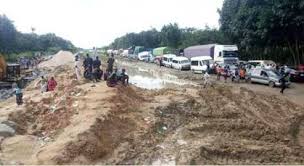Road users face harrowing trips on the dilapidated Benin-Warri highway, with commuters and transporters losing hours in gridlock and chaos.
A visit to the road on Wednesday revealed a pitiable condition as the federal highway has become a death trap.
In the Benin axis, places like Limit Road junction, Agip, PZ, and Adesuwa junction are filled with potholes, while the ongoing construction has stopped with no contractor on site.
The bad portions at Santana Market Junction, filled with heavy stones, have become a nightmare for small vehicle users, who risk damaging their tyres while trying to navigate the area.
Another major trouble spot is the Ologbo axis, a border town between Edo and Delta states, where vehicles, especially heavy-duty trucks, often spend days before they can cross into either state.
The situation is the same in Warri as vehicles have to connect the town by using inner roads, as the major road has become an eyesore.
Angered by the state of the road, a group, Southern Solidarity Alliance, in a statement on Wednesday, expressed grave concern over the unbearable and deteriorating condition of the road.
The statement, signed by the National Coordinator, Ndubuisi Okafor and the Directorate of Publicity, Orakpor Ogheneganaye, lamented that the major federal highway had now turned into a symbol of abandonment and untold hardship.
The group also said that the road, which was once a key economic route connecting the South-South to the rest of Nigeria, was in ruins.
“Commuters spend endless hours navigating through waterlogged ditches and deep craters.
“Trailers fall, buses break down, and innocent lives are lost daily. The people are angry. The people are in pain. And the nation must not look away,” the statement read.
It called on President Bola Tinubu to break the silence and take immediate action.
“The Benin-Warri Road has gone beyond seasonal repair. It needs urgent and complete reconstruction.
“This road represents the suffering and resilience of the people of Edo and Delta states who continue to pay the price for federal neglect.
“Mr President, this is your moment to show leadership. Your silence will only deepen the wounds and widen the gap between the centre and the forgotten corners of this nation,” it added.
The group demanded action, asking the Federal Ministry of Works to mobilise equipment and resources to commence a full rehabilitation.
“The government must end the cycle of temporary patches and start a lasting solution with proper engineering, flood control, drainage and supervision.
“This is not just about fixing a road. It is about restoring hope, rebuilding trust and affirming that every region matters under your administration,” it added.
A regular road user, Tony Osauzo, who is also a senior journalist in Edo, said a journey which used to take him 45 minutes to get to Warri from Benin now takes five hours, depending on how the driver is able to navigate his way.
He said, “Those portions at the Benin end of the road have remained like that over the years. Successive governments keep saying they are working on the road, but no one can really say what is happening, as it has become a topsy-turvy affair.
“The road is smooth to RRIN and BORDA Junction, and from that point to Ologbo.
“The road is bad between Ologbo town and the bridge that separates Edo and Delta states. One side of the road is done with concrete, and that is where moving to and from Edo State is used, but the other side remains unattended.”
A transporter who plies the road but pleaded anonymity said, “Before now, I could boast of not less than five trips in a day from Ring Road to Ologbo. However, it is no longer so, as you could be in one spot for more than one hour.
“It is tough, it is painful. Edo State Governor, Monday Okpebholo, has been trying, but he should prevail on the Federal Government to finish this work.”
The interstate transporter said the situation had affected customer turnover and income because they spend more hours on the road and visit mechanic workshops after every trip.
“Before now, a journey from Benin to Warri was 50 minutes maximum, but now we spend not less than two hours, 30 minutes, sometimes even more than that,” he said.

